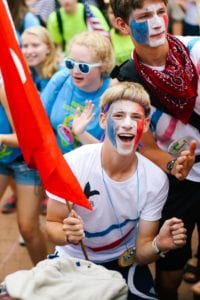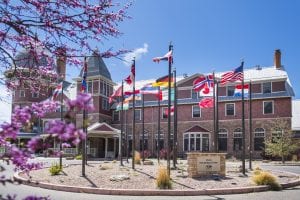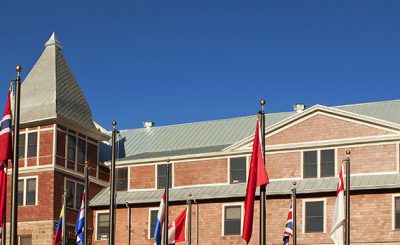“After three summers at Concordia Language Villages,” says Mads Benishek, “I approached my United World College experience with more of an open mind than I would have otherwise. I came to UWC very open to what it could be; I was prepared for the challenges of a roommate, a new place, a new community, and the kind of intensive learning that happens in an immersion environment.”

Concordia Language Villages and the United World College were established in 1961 and 1962, respectively. Both thrived in part because of an acute sense that youth were the answer to the difficult questions that the Cold War posed. At Concordia Language Villages (CLV), young people are immersed in a language and cultural summer camp where learning a language is the means to achieve intercultural understanding. The United World Colleges are two-year residential high schools on five continents where students develop the skills of peacemaking as they learn and work together.
Both focus on building the capacity for youth to see the world differently while forming powerful relationships with others during an intensive, immersive international experience.
Both programs have strong program and mission similarities and, not surprisingly, there are a number of CLVers who became UWCers. Asked to reflect on their experiences, two villagers who later received Davis Scholarships to attend their last two years of high school at a UWC, shared the ways that the programs complement each other.

Leo Penny, a senior at Brown University double-majoring in biology and geology-chemistry, feels that his three summers at Sen Lin Hu, the Chinese Language Village, prepared him for UWC Waterford Kamhlaba, one of the two UWCs on the African continent.
“I was definitely pushed to learn an impressive amount in both programs,” Leo said. “At CLV, we were encouraged to be curious about the target language and culture; I dove into both and was rewarded for it. UWC also celebrated the same kinds of curiosity but the focus on the International Baccalaureate and the academic program was the most challenging and rewarding.”
Mads Benishek, an alumnus of Lac du Bois, the French Language Village, attended the UWC in Flekke, Norway graduating in 2009. He also returned to CLV as a staff member after his two years in Norway. “CLV prepared me for a UWC experience by teaching me to expect surprises and helping me become more comfortable not understanding everything all the time,” Mads said. “CLV helped me learn to be curious about things that are different, like food or customs or habits.”
The parents of both Davis Scholars saw changes in Mads and Leo as they progressed from CLV to UWC. “While we had no idea about UWC at the time, we think that our family’s CLV experience was actually a kind of test run for what would become our UWC experience a few years later,” said Gretchen Penny, Leo’s mother. “For Leo, CLV was a way to experience a different life and culture, if only for a couple of weeks in the summer. As his parents, we found that CLV tested our comfort and confidence in Leo’s ability to be successful without our constant attention and support. This turned out to be important when it came time to send Leo across the ocean to a distant UWC campus.”
Mads’ mother, M.E. Emma DeJonge, speaks to the confidence Mads gained in both programs. “Mads always had a strong sense of self and came back from French camp with even greater confidence. He returned from two years at the UWC in Norway with a depth and clarity about his identity and values that struck me as being incredibly rare in an 18-year-old. Mads returned with an internal sense of ‘this is who I am, these are my values, and this is how I am going to walk in the world’ that was vividly clear, amazingly strong, yet as quiet as a whisper to those around him.”
The 18 UWCs around the world and all CLV programs in 15 languages rely on a foundation of strong community to deliver the programs. At CLV, when a community is stronger and more supportive, villagers of all ages are more willing to muster the courage to speak a new language. For students attending a UWC, they find that they must learn to trust one another to work together in classrooms and during community service and activities. The focus for both is on how these community-building skills and experiences will help alumni forge coalitions and alliances to tackle the challenges our world currently faces.
The UWC and CLV missions seek to give youth the skills to build effective communities across political, cultural, linguistic, and social divides to work toward a more peaceful and sustainable world. Gretchen Penny summarized the benefits of the programs working in tandem with each other: “Both of these experiences gave Leo the confidence to seek out new opportunities, regardless of – or maybe because of – geographic or cultural differences.”
Concordia Language Villages offers language immersion programs in 15 languages for youth 7 – 18. U.S. high school students are eligible for Davis Scholarships to attend the last two years of secondary school at one of 18 UWCs around the world.

